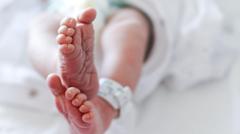Could Vaccination Have Saved This Baby from Whooping Cough?

Published: 2025-08-31 09:14:08 | Category: technology
This tragic incident highlights the critical importance of vaccination during pregnancy, particularly against whooping cough, to protect newborns. The recent death of a baby in the UK, attributed to whooping cough, underscores the potential dangers of vaccine hesitancy and low vaccination rates among expectant mothers. It serves as a stark reminder of the need for increased awareness and action on vaccination uptake.
Last updated: 05 October 2023 (BST)
Key Takeaways
- A baby has died from whooping cough in the UK, marking the first fatal case of 2025.
- The mother was not vaccinated during pregnancy, highlighting the importance of maternal vaccination.
- Vaccination rates among pregnant women stand at 72.6%, below the recommended levels.
- Low uptake of childhood vaccinations, including MMR, raises concerns about herd immunity.
- Government campaigns aim to address vaccine hesitancy following the Covid-19 pandemic.
Understanding Whooping Cough
Whooping cough, medically known as pertussis, is a highly contagious bacterial infection that primarily affects the lungs and airways. The bacteria responsible for this illness, Bordetella pertussis, can lead to severe coughing fits, making it difficult for infants to breathe. This disease is particularly dangerous for babies under the age of one, who are at a higher risk of serious complications and, tragically, death.
The Importance of Vaccination During Pregnancy
Vaccination against whooping cough during pregnancy is crucial for the protection of newborns. The UK Health Security Agency (UKHSA) recommends that pregnant women receive the vaccine, ideally during the third trimester. This timing helps to ensure that mothers can pass on antibodies to their babies, offering them passive immunity during their most vulnerable early weeks of life.
Despite the recommendations, recent statistics reveal that only 72.6% of pregnant women in the UK are vaccinated against whooping cough. This figure is concerning, given that maternal vaccination is key to reducing infant mortality rates associated with the disease.
Recent Trends in Vaccination Uptake
The UK has witnessed a worrying trend in vaccine uptake, particularly among children. Recent data indicates that none of the main childhood vaccines achieved the 95% uptake target recommended by the World Health Organization (WHO). For instance, the uptake of the measles, mumps, and rubella (MMR) vaccine among five-year-olds stood at just 91.9%, the lowest level since 2010/11.
Overall, the uptake for both doses of the MMR vaccine was recorded at 83.7%, the lowest since 2009/10. This decline in vaccination rates has been linked to a rise in vaccine hesitancy, which has been exacerbated by misinformation surrounding vaccines, particularly during and after the Covid-19 pandemic.
Consequences of Low Vaccination Rates
The decline in vaccination rates has serious implications for public health. Low uptake can lead to outbreaks of vaccine-preventable diseases, as evidenced by the increase in measles cases earlier this year. In July, a tragic incident occurred when a child died from measles at Alder Hey Children's Hospital, further highlighting the consequences of low vaccination coverage.
Health officials have consistently warned that maintaining high vaccination rates is crucial for achieving herd immunity, which helps protect those who cannot be vaccinated due to medical reasons. The WHO recommends that at least 95% of children receive their vaccinations to establish herd immunity effectively.
Addressing Vaccine Hesitancy
In light of the increasing vaccine hesitancy, the UK government has announced plans to launch campaigns aimed at educating the public about the importance and safety of vaccinations. Health Minister Stephen Kinnock has emphasized the need for clear communication about the benefits of vaccines, stating that misinformation must be countered to protect public health.
These campaigns are particularly timely, as the government prepares to introduce a free chickenpox vaccine for young children through the NHS, starting in January 2026. By addressing concerns and providing accurate information, the government hopes to improve vaccination uptake across the population.
The Role of Health Professionals
Health professionals play a critical role in encouraging vaccination among expectant mothers and parents. They are often the first point of contact for information about vaccines and can provide guidance on the importance of vaccination during pregnancy. By fostering an open dialogue, healthcare providers can help dispel myths and address concerns about vaccine safety and efficacy.
What Happens Next?
Moving forward, it is essential for health authorities to monitor vaccination rates closely and implement strategies to improve uptake. This includes ongoing public health campaigns, education initiatives, and collaborations with healthcare providers to foster trust in vaccines.
As we reflect on the recent tragic death of the infant, it serves as a critical reminder of the vital role vaccinations play in protecting vulnerable populations. Ensuring that pregnant women and children receive their vaccinations can save lives and prevent further outbreaks of whooping cough and other vaccine-preventable diseases.
FAQs
What is whooping cough?
Whooping cough, or pertussis, is a bacterial infection that affects the lungs and airways, characterised by severe coughing fits. It poses significant risks, especially for infants.
Why is vaccination during pregnancy important?
Vaccination during pregnancy helps pass protective antibodies from the mother to the baby, providing essential immunity in the early weeks of life when infants are most vulnerable.
What are the current vaccination rates in the UK?
As of recent data, vaccination rates among pregnant women for whooping cough stand at 72.6%, while childhood vaccinations like MMR have seen a decline, with only 91.9% coverage among five-year-olds.
What are the consequences of low vaccination uptake?
Low vaccination uptake can lead to outbreaks of preventable diseases, increased hospitalisations, and, in severe cases, fatalities, as seen with recent measles and whooping cough incidents.
How is the government addressing vaccine hesitancy?
The UK government plans to launch campaigns to educate the public about the safety and benefits of vaccines, aiming to combat misinformation and increase vaccination rates.
As we continue to navigate the challenges posed by vaccine hesitancy and public health, it is crucial to advocate for the importance of vaccinations. Understanding the risks associated with diseases like whooping cough can empower individuals and families to make informed health decisions. #VaccinationMatters #WhoopingCough #PublicHealth



